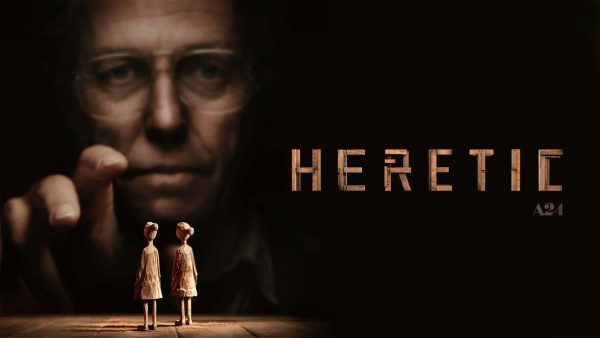Spooky season may be over, but horror movie season is year-long. A week after Halloween, A24’s new horror-thriller “Heretic” — a dialogue-driven think piece starring Sophie Thatcher, Chloe East and Hugh Grant — released in theaters. Thatcher and East star as Sister Barnes and Sister Paxton respectively, two missionaries for the Church of Jesus Christ of Latter-Day Saints, and Grant plays Mr. Reed, a charming, bumbling man who eventually reveals himself to be the dark side of every atheist joke. 
“Heretic” begins with lighthearted banter as the missionaries discuss condom sizes and advertising and Mr. Reed asks the two how they feel about the history of polygamy in the LDS church. That is not to say that the first act is entirely devoid of tension. Some of the first things we learn about Mr. Reed’s house are that his lights run on a timer and that he has metal built into the walls and roof, rendering cell phones completely useless. But he assures Sisters Barnes and Paxton that his wife is in the next room baking a pie, meeting their stipulation that another woman must be present for them to enter and remain in the house.
It seems like Mr. Reed is a little odd but ultimately harmless. What could possibly go wrong?
We realize that things are not what they seem when Sister Barnes turns the candle Mr. Reed has set on the table around to reveal that the blueberry pie smell permeating through the house is not, in fact, his wife baking. This casts the existence of his wife entirely into doubt. Mr. Reed eventually uses their willingness to believe a wife is present despite mounting evidence to the contrary as a metaphor for their faith in a higher power.
Philosophical discussions about the origin of the three major religions — Judaism, Christianity and Islam — ensue. Mr. Reed uses, of all things, the creation and evolution of Monopoly and the interpolation of “The Air That I Breathe” by The Hollies into “Creep” by Radiohead and eventually “Get Free” by Lana Del Rey to prove his point. He asserts that every religion is just a dilution of another that came before it, rendering all belief systems invalid. But he says he can show the girls the “one true religion” which should make all his philosophizing worth their while.
Eventually, the girls have had enough of his disrespect for religion and they ask to leave, at which point he writes “Belief” and “Disbelief” on two doors that supposedly lead out of his house. He tells them they should go through whatever door they feel applies to them, and whatever door they choose will lead to their enlightenment.
Practically speaking, “Heretic” makes excellent use of the horror genre’s best tool in its arsenal: sound. Remove the sound from any horror movie, and you remove the tension, the buildup and the payoff from the inevitable jump scare. Through its use of sharp, loud noises that might be footsteps but could be something more sinister and death-rattle voices that could make anyone’s hair stand on end, “Heretic” creates a perfectly chilling atmosphere. The dim, hazy lighting throughout most of the movie and the snowstorm roaring outside aid in transporting the audience into each eerie scene as well.
Thatcher and East shine as well, playing near-opposites whose differing perspectives on faith elevate the discussion from what could be a one-sided lecture about the faults of organized religion to a conversation about what humanity values. Grant’s otherwise charming demeanor, which he has flaunted in previous films like “Notting Hill” and “Love Actually” becomes a weapon to draw the missionaries and the audience into his theological cat-and-mouse game.
“Heretic” proves that horror movies don’t all need to be CGI-filled nightmare-fests like “The Conjuring” franchise or “Alien” where the “monster” is an actual monster; sometimes, the best horror lies in something that feels just real enough.



Leave a Comment